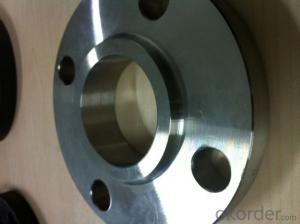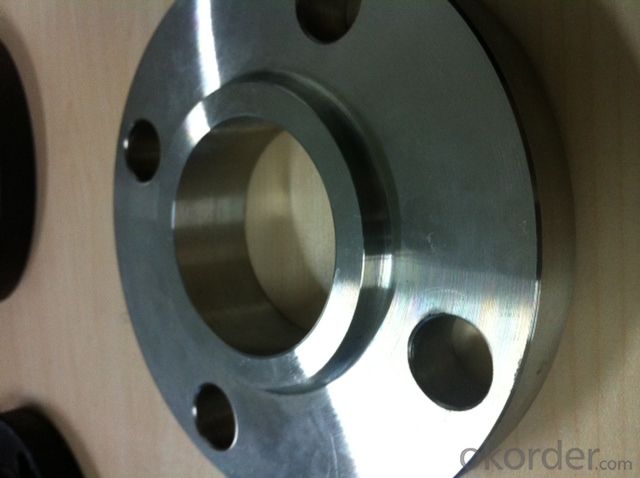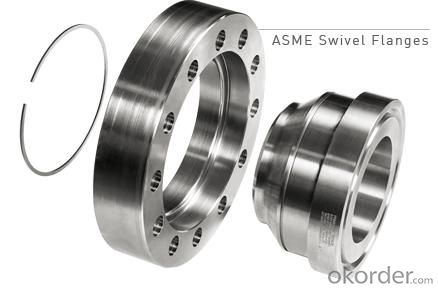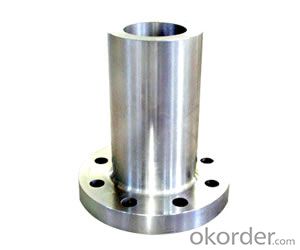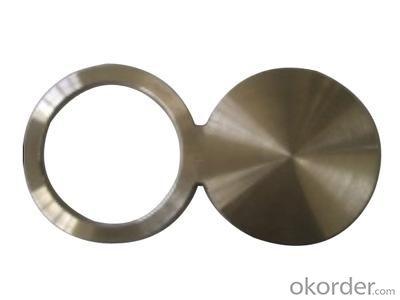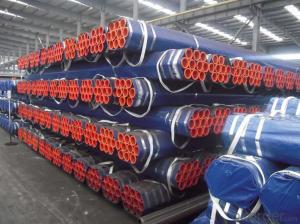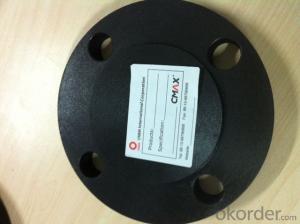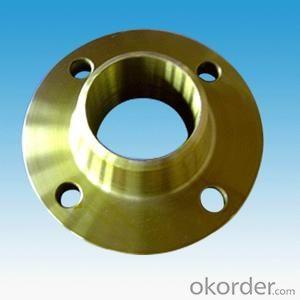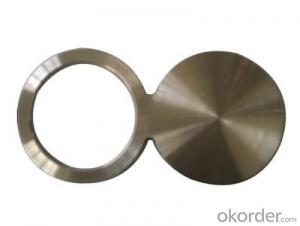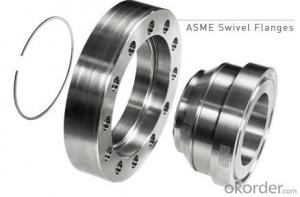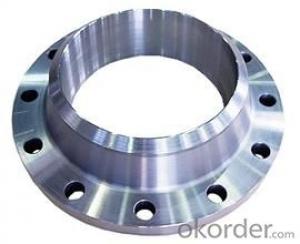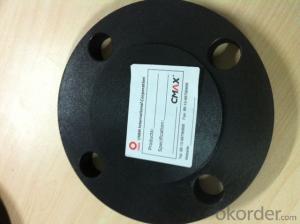STAINLESS STEEL FORGED FLANGE A105 ASME B16.5
- Loading Port:
- Tianjin
- Payment Terms:
- TT OR LC
- Min Order Qty:
- 1 pc
- Supply Capability:
- 10000 pc/month
OKorder Service Pledge
OKorder Financial Service
You Might Also Like
Package Of Stainless Steel Flange:
PACKED IN PLYWOOD CASES OR PALLETS
Painting Of Stainless Steel Flange:
ANTI-RUST OIL
Marking Of Stainless Steel Flange:
REFER TO MARKING DOCUMENT or AS PER CUSTOMER REQUEST
Shipping Marks Of Stainless Steel Flange:
EACH WOODEN BOX TWO PLASTIC SHIPPING MARKS
Specification Of Stainless Steel Flange:
Carbon Steel Flange Slip On Flange, Plate Flange, Blind Flange, Welding Neck Flange, Socket Welded Flange, Thread Flange, Lap Joint Flange, Long Welding Neck Flange
Size : 1/2"-48"
Wall Thickness.: SCH10-SCH160, SGP , XS, XXS, DIN ,STD
| Name | Stainless Steel Flange |
| Size | 1/2" - 48" |
| Face | RF, FF, RTJ |
| Wall thickness | Sch5-Sch160 XXS,STD,XS, SGP |
| Standard | ASME B16.5, B16.47, BS4504, JIS B2220, API 6A, 11Detc. |
| We can also produce according to drawing and standards provided by customers. | |
| Material | 304, 304L, 316, 316L, 304/304L, 316/316L, EN1.4301, EN1.4404 etc. |
| Packaging | Wooden Cases, wooden pallet , or carton box , or nylog bag and then in wooden cases |
| Surface Treatment | Anti-rust Oil |
| Delivery Time | 20-30 days, after received advance payment. |
| Quality | 100% Heat Treatment, No Welding repair |
| Others | 1.Special design available according to your drawing. |
| 2.anti-corrosion and high-temperature resistant with black painting | |
| 3. All the production process are made under the ISO9001:2000 strictly. | |
| 4. A conformity rate of ex-factory inspection of products. | |
| 5. we have export right , offering FOB , CNF CIF price |
STANDARD & MATERIAL GRADE
STAMDARD Of Stainless Steel Flange
| Standard | Pressure | Size | |
| European Standard | EN 1092-1 | Class PN6 ~ PN100 | DN10 ~ DN4000 |
| American Standard | ASME B16.5 | Class 150 ~ 2500 | 1/2" ~ 24" |
| ASME B16.47A | Class 150 ~ 900 | 26" ~ 60" | |
| ASME B16.47B | Class 75 ~ 900 | 26" ~ 60" | |
| German Standard | DIN 2527,2566,2573, 2576, 2627-2638,2641,2642,2655,2656 | PN6~PN100 | DN10 ~ DN4000 |
| Australian Standard | AS2129 | Table: T/A, T/D, T/E, T/F, T/H, T/J, T/K, T/R, T/S, T/T | DN15 ~ DN3000 |
| AS4087 | PN16 ~ PN35 | DN50 ~ DN1200 | |
| British Standard | BS4504 | PN2.5 ~ PN40 | DN10 ~ DN4000 |
| BS10 | T/A, T/D, T/E, T/F, T/H | 1/2" ~ 48" | |
| Japanese Standard | JIS B2220 | 5K ~ 30K | DN10 ~ DN1500 |
| API Standard | API 6A, 11D | 2000 PSI ~ 20000 PSI | 1 13/16" ~ 30" |
| French Standard | NFE 29203 | PN2.5 ~ PN420 | DN10 ~ DN600 |
MATERIAL Of Stainless Steel Flange
| Stainless Steel | ||
| Material Standard | Material Grade | |
| ASTM | ASTM A182 | F304 / F304 L |
| ASTM A182 | F316/ F316L | |
| ASTM A182 | F310, F321 | |
| ASTM A182 | F321 | |
| DIN EN | DIN EN 10222-5 | EN 1.4301 |
| DIN EN 10222-5 | EN 1.4404 | |
| JIS | JIS G3214 | SUS F304 |
| JIS G3214 | SUS F304L | |
| JIS G3214 | SUS F316 | |
| JIS G3214 | SUS F316L | |
- Q: What is the primary purpose of steel pipes?
- The primary purpose of steel pipes is to transport fluids and gases, such as water, oil, and natural gas, over long distances efficiently and safely. They are commonly used in various industries including construction, oil and gas, and infrastructure development.
- Q: What is the tensile strength of steel pipes?
- The grade and type of steel used can cause variation in the tensile strength of steel pipes. However, steel pipes generally possess a high tensile strength. Carbon steel pipes typically have a tensile strength range from 370 to 700 MPa, while alloy steel pipes can have a tensile strength range from 770 to 1200 MPa. These impressive tensile strengths enable steel pipes to withstand substantial pressure and stress, making them suitable for diverse applications in industries like construction, oil and gas, and automotive. It is important to recognize that factors like the manufacturing process, heat treatment, and the presence of defects or imperfections can also impact the tensile strength of steel pipes. Hence, it is recommended to consult the manufacturer's specifications or industry standards to determine the precise tensile strength of a specific steel pipe.
- Q: How are steel pipes used in the pulp and paper industry?
- Steel pipes are widely used in the pulp and paper industry for various applications. They are primarily used for conveying corrosive chemicals, hot water, steam, and other fluids throughout the production process. Steel pipes provide high strength, durability, and resistance to corrosion, which is crucial in an industry where harsh chemicals are involved. They are used in the transportation of pulp, bleaching agents, and various liquids within the production facilities, ensuring efficient and reliable operations in the pulp and paper industry.
- Q: How are steel pipes used in the manufacturing of appliances?
- Steel pipes are commonly used in the manufacturing of appliances as they provide a durable and reliable solution for various applications. They are used for carrying fluids, gases, and even electrical wiring within appliances due to their high strength and resistance to corrosion. Additionally, steel pipes are also utilized for structural support and framing, ensuring the stability and longevity of appliances.
- Q: What are the common uses of steel pipes in construction?
- Due to their durability and strength, steel pipes are widely used in construction for various purposes. Plumbing systems in buildings commonly rely on steel pipes, which can effectively transport water, gas, and other fluids. Their resistance to corrosion and ability to withstand high pressure make them the preferred choice over alternative materials. Steel pipes are also frequently employed for structural support in construction. They serve as columns or beams, providing buildings with structural integrity and stability. With their capacity to support heavy loads, steel pipes are highly favored in the construction industry. Bridges and highways often incorporate steel pipes into their design. They are utilized to create sturdy and long-lasting bridge supports, guardrails, and signposts. The ability of steel pipes to endure extreme weather conditions and heavy traffic makes them a reliable option for infrastructure projects. Additionally, steel pipes are indispensable for underground utilities like sewer and drainage systems. They offer a robust solution for transporting wastewater and preventing leaks. Moreover, they play a crucial role in constructing underground tunnels and pipelines. Furthermore, steel pipes find application in fencing, scaffolding, and handrails in construction. Their strength, versatility, and ability to withstand harsh environmental conditions make them a preferred choice. In summary, steel pipes are vital components in construction due to their numerous advantages. Their durability, strength, and resistance to corrosion make them a reliable choice for various applications in the construction industry.
- Q: What are the factors affecting the durability of steel pipes?
- There are several factors that can affect the durability of steel pipes, including the quality of the steel used, the manufacturing process, the environment in which the pipes are installed, and the maintenance and care given to the pipes.
- Q: What is the difference between hot-dipped galvanized and electro-galvanized steel pipes?
- Both hot-dipped galvanized and electro-galvanized steel pipes undergo a galvanization process to protect them from corrosion. However, there are distinct differences between the two methods. Hot-dipped galvanized steel pipes are immersed in molten zinc, resulting in a thick zinc coating on the steel's surface. This creates a durable and long-lasting barrier against corrosion. The thickness of the zinc coating varies, but it is generally thicker than that of electro-galvanized steel pipes. In contrast, electro-galvanized steel pipes are coated with a thin layer of zinc through an electroplating process. This involves passing an electric current through the pipes while they are submerged in a zinc solution. The zinc particles are then deposited onto the steel's surface, creating a thin and uniform protective layer. One key difference is the thickness of the zinc coating. Hot-dipped galvanized steel pipes have a thicker and more robust coating, making them suitable for harsh environments or exposure to corrosive materials. Another distinction is the appearance of the pipes. Hot-dipped galvanized steel pipes typically have a dull grayish finish, while electro-galvanized steel pipes have a smoother and more polished look. In terms of cost, electro-galvanized steel pipes are generally more economical because the electroplating process requires less labor and zinc. Ultimately, the choice between hot-dipped galvanized and electro-galvanized steel pipes depends on the specific application and desired level of corrosion resistance. Hot-dipped galvanized steel pipes are typically used in demanding environments, while electro-galvanized steel pipes are suitable for less corrosive applications where cost-efficiency is important.
- Q: What are the safety measures to consider when working with steel pipes?
- When working with steel pipes, it is important to follow specific safety measures to ensure a safe working environment. Some key safety measures to consider include wearing appropriate personal protective equipment (PPE) such as gloves, safety glasses, and steel-toed boots to protect against potential injuries. Additionally, workers should be cautious of sharp edges and use tools designed for cutting and handling steel pipes. It is crucial to secure pipes properly to prevent accidents caused by falling or rolling pipes. Lastly, workers should be trained on proper lifting techniques to avoid strain or injury when handling heavy steel pipes.
- Q: Can steel pipes be used for conveying hazardous materials?
- Steel pipes can be used for conveying hazardous materials, as they are strong, durable, and resistant to corrosion. However, it is essential to consider the specific properties and compatibility of the hazardous material with steel to ensure safe transportation, as some chemicals or substances may react with steel or pose additional risks. Proper precautions, such as appropriate lining or coating, should be taken to minimize any potential hazards during transportation.
- Q: Are steel pipes resistant to fire?
- Yes, steel pipes are highly resistant to fire due to their high melting point and ability to withstand intense heat and flames.
Send your message to us
STAINLESS STEEL FORGED FLANGE A105 ASME B16.5
- Loading Port:
- Tianjin
- Payment Terms:
- TT OR LC
- Min Order Qty:
- 1 pc
- Supply Capability:
- 10000 pc/month
OKorder Service Pledge
OKorder Financial Service
Similar products
Hot products
Hot Searches
Related keywords
